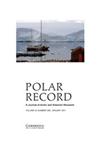Unfinished indigenous geographies: The endurances and becomings of a Sámi tourism venture
IF 1.6
4区 环境科学与生态学
Q3 ECOLOGY
引用次数: 0
Abstract
Abstract For many years, and within the context of pre-pandemic tourism growth in the Norwegian Arctic, governmental institutions have had expectations that Sámi indigenous people of the north of Norway should engage more strongly in the tourism economy. What does it however imply for Sámi people to become agents in tourism and take ownership to tourism development? This paper attends to Sámi people who engage as entrepreneurs in tourism in Norwegian parts of Sápmi. We suggest ways to identify when and how indigeneity emerges as a topic and meaning dimension that makes a difference in the entrepreneurship process and discuss how Sáminess can mark the process in ambiguous ways. The current paper’s exploration is enabled by a qualitative co-creative study and detailed account of a Sámi tourism venture in a coastal town in Finnmark, Norway. The paper attends to the venture as part of the entrepreneurs’ life stories, everyday life, and material relational practices and explores the intrinsic geographies and histories to which their various relational practices connect the enterprise. Sámi entrepreneurships in tourism are considered in light of the unstable and changing ethnic qualities of places, through an approach that acknowledges the current transformative complexities of indigeneity. The analysis illuminates tourism entrepreneurs’ engagements in indigenously transgressive enactments of places and of Sámi culture and tells about vitalities and vulnerabilities involved in becoming indigenous agents in Arctic destinations.未完成的土著地理:Sámi旅游企业的耐力和成就
多年来,在挪威北极地区大流行前旅游业增长的背景下,政府机构一直期望Sámi挪威北部的土著人民应该更有力地参与旅游经济。然而,Sámi人们成为旅游的代理人并拥有旅游发展的所有权意味着什么?本文关注Sámi在Sápmi挪威部分地区从事旅游业的企业家。我们提出了一些方法,以确定何时以及如何将土著作为一个主题和意义维度出现,从而在创业过程中产生影响,并讨论Sáminess如何以模糊的方式标记这一过程。当前论文的探索是通过定性的共同创造研究和对挪威芬马克沿海城镇Sámi旅游企业的详细描述来实现的。本文将创业作为企业家生活故事、日常生活和物质关系实践的一部分,并探讨了他们的各种关系实践将企业联系起来的内在地理和历史。Sámi旅游业的创业精神是根据地方不稳定和不断变化的民族特质,通过一种承认当前土著变革复杂性的方法来考虑的。该分析阐明了旅游企业家对地方和Sámi文化的土著越界行为的参与,并讲述了成为北极目的地土著代理人所涉及的活力和脆弱性。
本文章由计算机程序翻译,如有差异,请以英文原文为准。
求助全文
约1分钟内获得全文
求助全文
来源期刊

Polar Record
环境科学-环境科学
CiteScore
1.40
自引率
25.00%
发文量
26
审稿时长
>36 weeks
期刊介绍:
Polar Record is an international, peer-reviewed scholarly periodical publishing results from a wide range of polar research areas. The journal covers original primary research papers in the humanities, social sciences, physical sciences, life sciences, and polar technology, as well as papers concerning current political, economic, legal, and environmental issues in the Arctic or Antarctic. Polar Record endeavours to provide rapid publication, normally within nine months of initial submission.
 求助内容:
求助内容: 应助结果提醒方式:
应助结果提醒方式:


